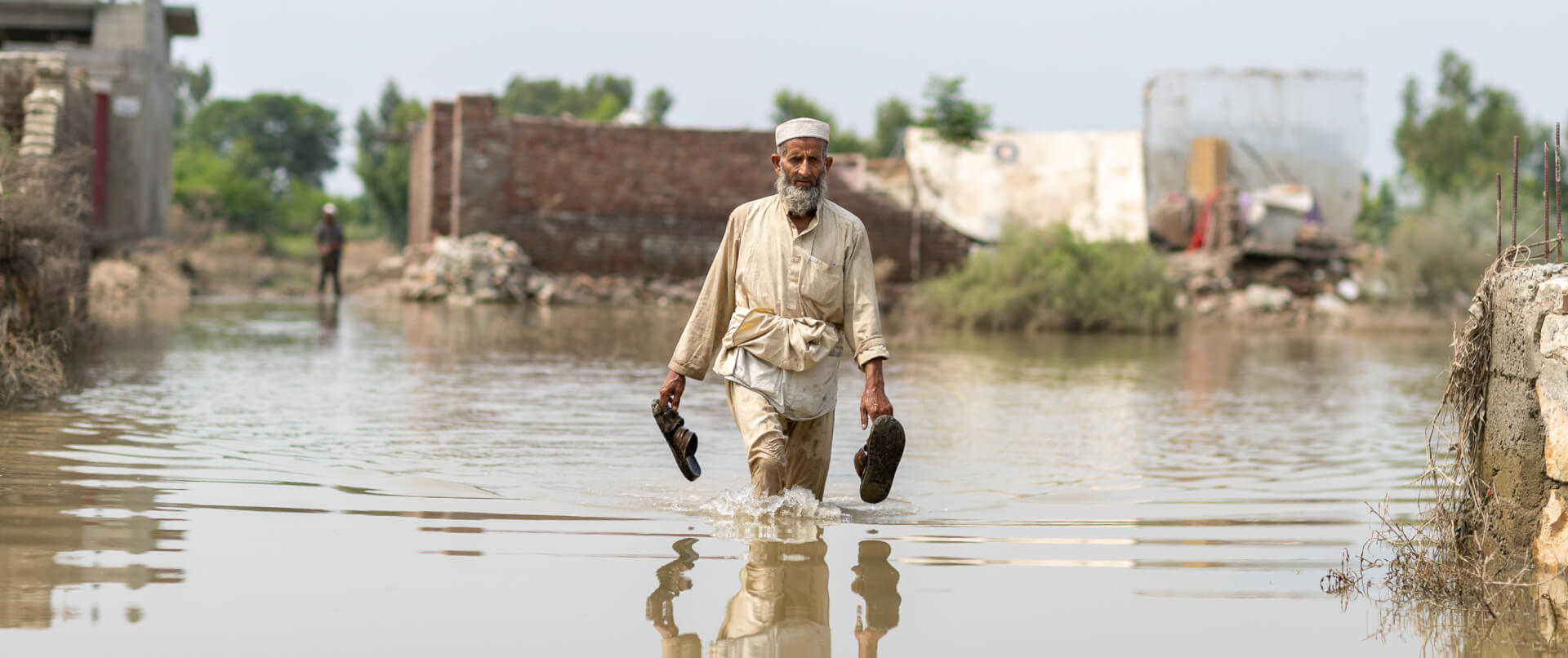Pakistani PM Shehbaz Sharif will present a flood-recovery, rehabilitation, and reconstruction plan on Monday at the UN International Conference on Resilient Pakistan in Geneva.
Co-hosting the conference with UN Secretary-General António Guterres, Sharif will present a plan to gather international support and facilitate long-term partnerships for Pakistan’s post-pandemic recovery in a document called “Resilient Recovery, Rehabilitation, and Reconstruction Framework” or the 4RF.
The framework delineates a two-point plan: First, it calls for $16.3 billion in aid from the international community over the next three years to help Pakistan address the immediate challenges of rehabilitation and reconstruction. Second, the 4RF will seek a $13.5 billion investment to help build climate-resilient infrastructure and improve the country’s communication channels, irrigation facilities, and disaster warning mechanisms.
Humanity is at an inflection point in world history. Our actions today will shape the resilient future for our succeeding generations. Millions of Pakistanis affected by unprecedented devastation look for compassion & solidarity to build back better. 3/3
— Shehbaz Sharif (@CMShehbaz) January 8, 2023
The UN, World Bank, Asian Development Bank, and the EU have jointly prepared the plan.
Sharif arrived in Geneva on Sunday evening. He is accompanied by Foreign Minister Bilawal Bhutto Zardari, Finance Minister Ishaq Dar, Minister of Climate Change Sherry Rehman, and Information and Broadcasting Minister Marriyum Aurangzeb. French President Emmanuel Macron will address the meeting as well.
PAKISTAN’S DEVASTATING FLOODS
In September 2022, Pakistan witnessed record-breaking torrential rains and melting glaciers, which caused floods that displaced over 8 million people and killed at least 1,700. While the floods have ended, Islamabad is struggling with reconstructing roads, houses, and other infrastructure following the natural disaster, which is predicted to cost it $16.3 billion.
Pakistan’s ambassador to the UN, Khalil Hashmi, said previously that while Islamabad was ready to pay for half the recovery costs, it needed to secure the remaining from international donors and partners.
Latest grim update from UNICEF on Pakistan floods:
— Michael Kugelman (@MichaelKugelman) January 8, 2023
-Nearly 15M people need emergency food aid
-10M kids need "immediate, life-saving support"
-9M people "being pushed into monetary poverty and learning losses"
This is 6+ months after the floods began.https://t.co/DKGj2xlGPQ
In an op-ed for The Guardian published last week, PM Sharif highlighted that several regions in Sindh and Balochistan “remain inundated,” with the flooded areas looking like “a huge series of permanent lakes.”
Sharif noted that the transformation of the terrain has doubled the number of food-insecure citizens to 14 million and pushed an additional 9 million into extreme poverty. “More than 2 million homes, 14,000km of roads, and 23,000 schools and clinics have been destroyed,” Sharif added.
PAKISTAN’S FINANCES IN DIRE STRAITS
Islamabad desperately needs post-disaster recovery funds as it faces an economic crunch that makes it difficult to secure food and energy imports and puts it at risk of defaulting on its sovereign debt obligations.
Pakistan: Last year's floods have affected 33 million people & could push 9 million more into poverty.
— United Nations (@UN) January 9, 2023
Monday's International Conference on Climate Resilient Pakistan will support recovery efforts & discuss climate-induced disaster preparedness. https://t.co/FDmaGH6YgA pic.twitter.com/S97au8X6JF
In the run-up to his visit to Geneva, Sharif said on Sunday that the funds were needed to “restore critical infrastructure, rebuild lives, and livelihoods and revive economy.”
In November, the Pakistani delegation at the COP27 meeting in Egypt vociferously advocated for a “loss and damage” fund to help relatively poorer countries that have been disproportionately affected by climate change. While the fund was eventually set up, it remains uncertain whether Islamabad will be given access to it.
UN’S CONCERN ABOUT FLOODS
After visiting the disaster-hit country in September, Guterres said the devastation was a “climate carnage.”
Rising inflation & loss of economic activity are making #recovery difficult for millions of families after the #FloodsInPakistan.@GovtofPakistan & @UN are co-hosting the International Conference on Climate #ResilientPakistan to support 🇵🇰 #BuildForwardBetter. pic.twitter.com/ZXBzqa8Ii9
— WFP Pakistan (@WFPPakistan) January 8, 2023
Similarly, the UNDP’s Pakistan Representative, Knut Ostby, urged the international community on Sunday to “stand with Pakistan” and use the “pivotal moment” to help it recover from the floods.
UNDP administrator Achim Steiner also called the floods a “cataclysmic event” in the run-up to Monday’s meet. He said that the global community has a “moral duty” to help Pakistan recover from the floods, given that it has contributed less than 1% to global greenhouse gas emissions.
IMF MEETING
Finance Minister Ishaq Dar will also meet with an IMF delegation on the sidelines of the UN meeting in Geneva. They are likely to host discussions on the release of the $1.1 billion that is a part of the IMF’s bailout programme, which has been halted due to Islamabad’s inability to fulfil the organisation’s preconditions of economic and political reforms, particularly the timeline for its post-flood recovery.
Recently, Dar has accused the IMF of acting “abnormally” in discussions about releasing the remaining tranches of the $7 billion bailout programme, which Pakistan secured in 2019.
An IMF delegation is also scheduled to visit Islamabad in the coming week.

